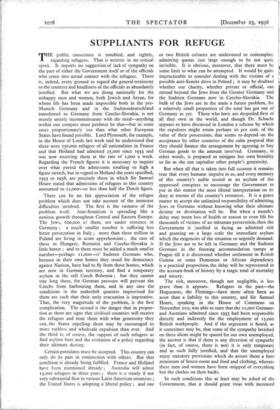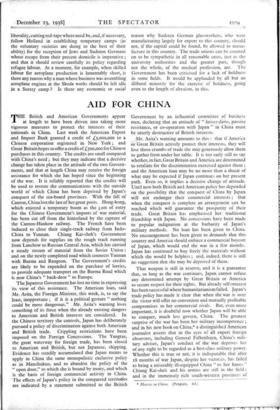SUPPLIANTS FOR REFUGE
THE public conscience is troubled, and rightly, regarding refugees. That is written in no critical spirit. It imports no suggestion of lack of sympathy on the part of either the Government itself or of the officials who come into actual contact with the refugees. There is, indeed, every ground to regard the general testimony to the courtesy and kindliness of the officials as abundantly justified. But what we are doing nationally for the unhappy men and women, both Jewish and Aryan, for whom life has been made impossible both in the pre- Munich Germany and in the Sudetendeutschland transferred to Germany from Czecho-Slovakia, is not merely utterly incommensurate with the need—anything within our compass must perforce be that—but in some cases proportionately less than what other European States have found possible. Lord Plymouth, for example, in the House of Lords last week said he understood that there were 250,000 refugees of all nationalities in France and that Holland had admitted 25,000 since 1933 and was now receiving them at the rate of i,000 a week. Regarding the French figures it is necessary to inquire over what period the admissions totalling so high a figure stretch, but in regard to Holland the years specified, 1933 to 1938, are precisely those in which Sir Samuel Hoare stated that admissions of refugees to this country amounted to i i,000—or less than half the Dutch figure.
There can be no fair appreciation of the refugee problem which does not take account of the immense difficulties involved. The first is the vastness of the problem itself. Anti-Semitism is spreading like a noxious growth throughout Central and Eastern Europe. The Jews, 600,00o of them, are under sentence in Germany ; a much smaller number is suffering less bitter persecution in Italy ; more than three million in Poland are living in acute apprehension ; the case of those in Hungary, Rumania and Czecho-Slovakia is little better ; and to them must be added a much smaller number—perhaps 11,000—of Sudeten Germans who, because in their own homes they stood for democracy against Nazism, have had to fly from those homes, which are now in German territory, and find a temporary asylum in the still Czech Bohemia ; but they cannot stay long there, for German pressure will prevent the Czechs from harbouring them, and in any case the conditions in the makeshift quarters improvised for them are such that their early evacuation is imperative. That, the very magnitude of the problem, is the first complication. The second is the danger that in propor- tion as there are signs that civilised countries will receive the refugees and treat them with what generosity they can, the States expelling them may be encouraged to more ruthless and wholesale expulsion than ever. And the third is, of course, the support of such refugees as find asylum here and the evolution of a policy regarding their ultimate destiny.
Certain postulates must be accepted. This country can only do its part in conjunction with others. But that condition is already being fulfilled. France and Holland have been mentioned already ; Australia will admit 15,000 refugees in three years ; there is a steady if not very substantial flow to various Latin American countries ; the United States is adopting a liberal policy ; and one or two British colonies are understood- to contemplate admitting quotas just large enough to be not quite invisible. It is obvious, moreover, that there must be some limit to what can be attempted. It would 1:oe spite impracticable to consider dealing with the victims, of a possible anti-Semite drive in Poland ; it may be doubted whether our charity, whether private or official, can extend beyond the Jews from the Greater Germany and the Sudeten Germans now in Czecho-Slovakia. The bulk of the Jews are in the main a future problem, for a relatively small proportion of the total has got out of Germany as yet. Those who have are despoiled first of all they own in the world, and though Dr. Schacht appears to have discussed in London a scheme by which the expulsees might retain perhaps 20 per cent. of the value of their possessions, that seems to depend on the acceptance by other countries of the calm proposal that they should finance the arrangement by agreeing to buy German goods to the amount involved. Germany, in other words, is prepared to mitigate her owri brutality so far as she can capitalise other people's generosity.
But when all that is taken into full account it remains true that every humane impulse in us, and, every memory of this country's noble record as an asylum of the oppressed conspires to encourage the Government to put in this matter the most liberal interpretation on its duty as trustee of the country's resources. It is a grave matter to accept the unlimited responsibility of admitting Jews or Germans without knowing what their ultimate destiny or destination will be. But when a month's delay may mean loss of health or reason or even life for thousands of victims of an inhuman persecution, then the Government is justified in facing an admitted risk and granting on a large scale the immediate asylum which the exigencies of the situation so urgently demand. If the Jews are to be left in Germany and the Sudeten Germans in the freezing accommodation 'camps at Prague till it is discovered whether settlement in British Guiana or some Dominion or African dependency is a practical proposition, the delay will be represented in the account-book of history by a tragic total of mortality and misery.
The risk, moreover, though not negligible, is less grave than it appears. Refugees in the past—the Huguenots, the Flemings—have more often been an asset than a liability to this country, and Sir Samuel Hoare, speaking in the House of Commons on November 21st, was able to state that the 11,000 Germans and Austrians admitted since 1933 had been responsible directly and indirectly for the employment of 15,000 British workpeople. And if the argument is heard, as it sometimes may be, that some of the sympathy lavished on these aliens might be spared for our own unemployed, the answer is that if there is any diversion of sympathy (in fact, of course, there is not) it is only temporary and as such fully justified, and that the unemployed enjoy statutory provisions which do assure them a bare minimum of house-room and food and clothing, whereas these men and women have been stripped of everything but the clothes on their backs.
In such conditions this at least may be asked of the Government, that it should grant visas with increased liberality, cutting red-tape where need be, and, if necessary, follow Holland in establishing temporary camps (as the voluntary societies are doing to the best of their ability) for the reception of Jews and Sudeten Germans whose' escape from their present domicile is imperative ; and that it should review carefully its policy regarding refugee labour. At a moment, for example, when skilled labour for aeroplane production is lamentably short, is there any reason why a man whose business was assembling aeroplane engines at the Skoda works should be left idle in a Surrey camp ? Is there any economic or social reason why Sudeten German glassworkers, who were manufacturing largely for export to this country, should not, if the capital could be found, be allowed to manu- facture in this country. The trade unions can be counted on to be sympathetic in all reasonable cases, just as the university authorities and the greater part, though not the whole, of the medical profession, are. The Government has been criticised for a lack of boldness in some fields. It would be applauded by all but an illiberal minority for the exercise of boldness, going even to the length of altruism, in this.



































 Previous page
Previous page